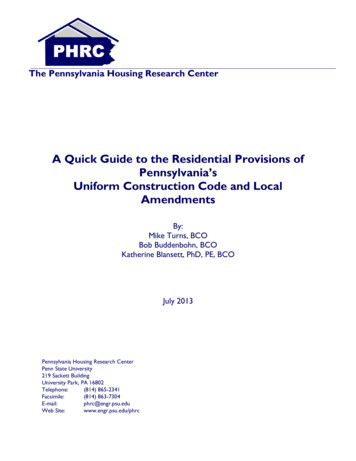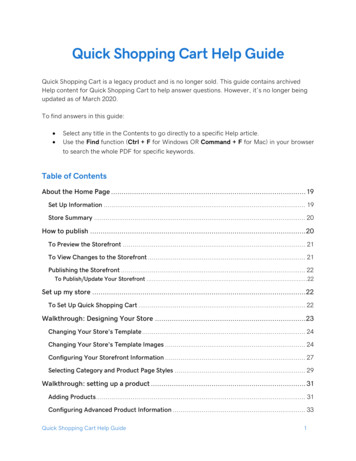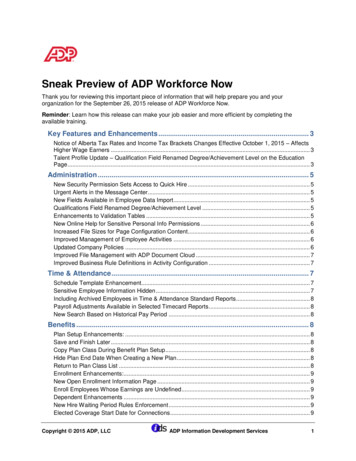
Transcription
The Pennsylvania Housing Research CenterA Quick Guide to the Residential Provisions ofPennsylvania’sUniform Construction Code and LocalAmendmentsBy:Mike Turns, BCOBob Buddenbohn, BCOKatherine Blansett, PhD, PE, BCOJuly 2013Pennsylvania Housing Research CenterPenn State University219 Sackett BuildingUniversity Park, PA 16802Telephone:(814) 865-2341Facsimile:(814) 863-7304E-mail:phrc@engr.psu.eduWeb Site:www.engr.psu.edu/phrc
Disclaimer:The Pennsylvania Housing Research Center (PHRC) exists to be of service to the housing community, especially in Pennsylvania. The PHRC conducts technicalprojects—research, development, demonstration, and technology transfer—under the sponsorship and with the support of numerous agencies, associations, companiesand individuals. Neither the PHRC, nor any of its sponsors, makes any warranty, expressed or implied, as to the accuracy or validity of the information contained in thisreport. Similarly, neither the PHRC, nor its sponsors, assumes any liability for the use of the information and procedures provided in this report. Opinions, whenexpressed, are those of the authors and do not necessarily reflect the views of either the PHRC or anyone of its sponsors. It would be appreciated, however, if any errors,of fact or interpretation or otherwise, could be promptly brought to our attention. If additional information is required, please contact:Katherine BlansettAssociate DirectorPHRCAli MemariHankin ChairPHRC
A Quick Guide to the Residential Provisions ofPennsylvania’sUniform Construction Code and Local AmendmentsTable of ContentsAn Overview of this Guide . 1-1Part 1 – An Overview of the Uniform Construction Code . 1-2I. Variations in the Uniformity of the Uniform Construction Code . 1-2II. Applicability of the Uniform Construction Code to Various Project Types . 1-3III. Contacting the Building Code Official . 1-5IV. Timeframes for Decisions. 1-6V. Fines and Penalties for Unpermitted Construction . 1-6VI. Building Permit and Inspection Fees . 1-6VII. Scheduling Inspections . 1-6VIII. Filing Appeals to Code Decisions . 1-7IX. Zoning, Land Use, and Other Municipal Approvals . 1-7X. Opt-Out Municipalities . 1-7XI. Summary of Residential Provisions of the UCC . 1-7XII. Resources. 1-8Part 2 – State and County Maps with Descriptions of Amendments to the UCC . 2-1
An Overview of this GuideThis guide focuses on the residential provisions of the Uniform Construction Code (UCC)1, whichdefines residential structures as one- and two-family dwellings and townhouses that are three stories orless in height above grade, and accessory structures to these types of buildings.Part 1 of this guide contains a brief summary of the UCC, along with an explanation for why there is apatchwork of code requirements found across the Commonwealth of Pennsylvania. Part 1 also providesan explanation of the types of amendments to the UCC that can be found in Pennsylvania municipalities.It also includes information regarding applying for permits, when a permit is or is not required and otherimportant information contained in the UCC related to residential applications of the code such as thetime frame for decision, fees, and filing appeals.Part 2 of this guide contains a series of maps indicating which Pennsylvania municipalities are on recordor have self-reported through a separate PHRC project2 as having amendments to the UCC. The first mapis a map of the entire Commonwealth, and subsequent maps show each county in Pennsylvania on aseparate page. These county maps are accompanied by tables showing available information on whataspects of construction these amendments regulate.1Uniform Construction Code Statute 35 P.S. §§7210.101 to 7210.1103. Act 45 of 1999 as amended. Availableonline at n 514&objID 552999&mode 22Kasal, B., Turns, M., Impact of the Uniform Construction Code in Rural Pennsylvania, the Center for RuralPennsylvania: A Legislative Agency of the Pennsylvania General Assembly, September 2010.1-1
Part 1 – An Overview of the UniformConstruction CodeI. Variations in the Uniformity of the Uniform Construction CodeIn the Pennsylvania Construction Code Act (Act 45 of 1999), policymakers cited several reasons foradopting a commonwealth-wide construction code in Pennsylvania. One of these reasons was, “toencourage standardization and economy in construction by providing requirements for construction andconstruction materials consistent with nationally recognized standards,” or in other words, to createuniformity. However, many townships, boroughs and cities in Pennsylvania have amendments to thecommonwealth’s Uniform Construction Code (UCC) that impose additional requirements to thosecontained in the state law and the adopted building codes.In 1999, the legislature gave each municipality the choice to opt-in or opt-out of administering andenforcing the UCC. About 92 percent of Pennsylvania municipalities chose to opt-in, meaning they areresponsible for enforcing UCC building codes through municipal building officials or contracts withcertified third-party agencies. Each opt-in municipality must have a single, designated Building CodeOfficial, who is the person ultimately responsible for building code enforcement in that municipality. Inopt-out municipalities, it is the responsibility of the building owner to obtain a permit from a certifiedthird-party agency (Sec 403.103).To determine whether a project will be located in an opt-in or an opt-out jurisdiction, interested partiescan contact the municipality, or visit the Department of Labor and Industry’s Uniform Construction Codewebpage, click on the “Local Enforcement” tab, and then follow the “Municipal Elections and ContactInformation” link.Two types of amendmentsLegal amendments to the UCC fall into two categories:1. local ordinances adopted before the passage of the Pennsylvania Construction Codes Act (notedas the pre-July 1, 1999 amendments), and2. ordinances adopted after implementation of the Act began (noted as the post-April 9, 2004amendments).The first category of amendment applies to any municipality that had a building code ordinance in effecton or before July 1, 1999 – provided the ordinance’s requirements are more restrictive than thosecontained in UCC-adopted building codes (including the International Residential Code). The secondtype of amendment is for municipalities who passed ordinances after April 9, 2004, the date theadministration of the Act took effect. Like pre-July 1, 1999 amendments, the post-April 9, 2004ordinances are required to be more stringent than UCC code provisions. The post-April 9, 2004amendment must go through a process described in the UCC Section 503, which requires approval by theDepartment of Labor and Industry. If the amendment is challenged during the approval process, amunicipality must demonstrate a special condition that would necessitate the ordinance.The Department of Labor and Industry declared all UCC amendments adopted between July 1, 1999 andApril 9, 2004 to be null and void.1-2
Act 45 did not require municipalities to file information about pre-July 1, 1999 ordinances with theDepartment of Labor and Industry – only to indicate whether or not they had an existing ordinance – andtherefore there is no official or centralized source that builders, remodelers, or policymakers may use todetermine what amendments exist in which municipalities. However, the Pennsylvania Housing ResearchCenter at Penn State conducted a survey for a 2010 report titled, Impact of the Uniform ConstructionCode in Rural Pennsylvania3, which asked municipalities and third-party agencies to categorize anyamendments to the UCC enforced in their jurisdictions. Part 2 of this guide contains a listing ofmunicipalities with pre-July 1, 1999 ordinances amending the UCC, along with self-reported informationon the aspects of construction regulated by those ordinances. This information on pre-July 1, 1999amendments is incomplete, so interested parties should contact a specific municipality to determinewhether any amendments are being enforced.There is a central source containing a list of all municipalities who have legally adopted post-April 9,2004 amendments. These ordinances, and a summary of their requirements, may be found at theDepartment of Labor and Industry’s Uniform Construction Code webpage under the “Local Enforcement”tab. Section 503 of the UCC outlines the process and requirements for amending.II. Applicability of the Uniform Construction Code to Various Project TypesWhen permits are required under the UCC, a contractor must apply for, and be issued, a building permitprior to initiating any aspect of construction. Work requiring permits relating to residential buildings andtheir accessory structures must comply with UCC-adopted building codes. The relevant code for projectscovered under the scope of this guide is the International Residential Code, published by the InternationalCode Council. This code is republished every three years with changes and additions, and contractorsmust use the edition that is currently adopted under Pennsylvania Department of Labor and Industryregulations. At present, Pennsylvania’s adopted code for residential structures is the 2009 edition of theInternational Residential Code. Permit applicants may ask to inspect a review of the InternationalResidential Code at the code office of any opt-in municipality.Residential Construction Projects Requiring PermitsIn addition to new construction, many types of projects require a building permit, inspections andcertificate of occupancy. List 1 contains a summary of residential-related project types for whichconstruction must be completed in accordance with UCC-adopted building codes; and for which buildingpermits, inspections, and certificates of occupancy are required under the UCC without exception(Section 403.62(a)).List 1. Projects that require permits and adherence to UCC-adopted buildingcodes under Pennsylvania’s Uniform Construction Code. All new residential constructionAll additions to existing residential construction, including:o Construction adding one or more stories on top of an existing dwellingo Construction increasing the perimeter of an existing dwellingInstalling a new manufactured (HUD-Code) home – Only items installed on-siteInstalling a new industrialized (modular) home – Only items installed on-site3Kasal, B., Turns, M., Impact of the Uniform Construction Code in Rural Pennsylvania, the Center for RuralPennsylvania: A Legislative Agency of the Pennsylvania General Assembly, September 2010.1-3
All attached garagesDetached garages, carports, sheds, or greenhouses 1,000 square feet or larger that areaccessory to a single-family dwellingDetached garages, carports, sheds, or greenhouses 120 square feet or larger that areaccessory to a two-family dwelling or townhouseEnclosing an existing porch or patioInstalling or building a sunroom or “three-seasons” roomNew decks greater than 30 inches above ground level at any point around theperimeter of the deckNew decks with roofs or coverings (any height above ground level)Installing hot tubs and spas (indoors or outdoors)Constructing an in-ground swimming pool (inside or outside)Installing any swimming pool (including inflatable) with a water depth of 24 inchesor moreNew fences higher than 6 feetNew retaining walls higher than 4 feetStructural alterations to existing dwellings (“Structural alteration” is not defined, butdoes not include minor framing changes needed to replace existing windows ordoors.)Changes to an existing means of egress, including: exit doors, stairs, handrails,guards, and rampsAny portion of a dwelling or residential accessory structure that will be used forcommercial purposes (open to employees or the public). Examples include:professional or business offices, notaries, beauty shops, nail salons, barber shops, caror equipment repairEmergency repair if a permit application is submitted to the BCO within 3 days Residential Exclusions from the UCC – Local Amendments May ExistThe UCC specifically lists types of projects that are excluded from the requirements of UCC-adoptedbuilding codes, and for which building permits, inspections, and certificates of occupancy are not requiredunder the UCC. Although not required by the UCC, permits for these items may be required inmunicipalities with legally adopted amendments to the UCC. See List 2 for a summary of project typesthat are excluded from the UCC but for which a local amendment is allowed.List 2. Projects that are excluded from Pennsylvania’s Uniform ConstructionCode and are exempt from the requirement to obtain a permit. Localamendments relating to these items are allowed. Detached garages, carports, sheds, or greenhouses less than 1,000 square feetthat are accessory to a single-family dwellingAll residential repairs – ordinary, emergency, or otherwise, unless the repairincludes a structural change or affects means of egressReplacement of residential equipmentResidential alterations (remodeling, renovations, maintenance, etc.) that are notstructural in natureInstallation of solar panels, geothermal systems, windmills and other alternativeenergy source equipment and structures (Some municipalities consider the1-4
installation of equipment on existing roofs to be structure alterations, and thusrequire permits without having a local amendment.)Finish work, including: painting, papering, carpeting, tile work, cabinetry,countertops, etc.Sidewalks, driveways, and other flatworkSwimming pools with a water depth of less than 24 inchesWindow replacementsInstallation of residential elevators and lifts for use in a single dwelling unit(There are Department of Labor and Industry regulations separate from the UCCfor elevators and lifts.)Residential Exemptions from the UCC – Local Amendments Not AllowedThere is an additional category of projects for which the UCC dictates that local amendments cannot beenacted. List 3 contains a summary of project types that are exempt from the requirements of UCCadopted building codes, and for which building permits, inspections, and certificates of occupancy are notrequired under the UCC. Local amendments are not allowed for these items.List 3. Projects that are exempt from Pennsylvania’s Uniform ConstructionCode. Local amendments relating to these items are not allowed. Recreational cabins meeting certain qualifications (affidavit must be filed withthe BCO)Plumbing, electrical, and graded lumber requirements in single-family dwellingsof members of recognized religious sects (affidavit must be filed with the BCO)Tubing, piping, fixtures, appliances and equipment connected to a source ofliquefied petroleum (propane) gasManufactured housingIII. Contacting the Building Code OfficialAs indicated above, Part 2 of this guide provides information on which municipalities are on record ashaving amendments, and the best information available on what those amendments regulate; however,interested parties contractor should contact an opt-in municipality’s designated Building Code Official(BCO) to determine whether a permit is required for projects that do not fall under the UCC, or if thereare any additional local requirements for any type of project. The BCO can also provide you with thefollowing information: a list of the types of activities where permits are required, permit applications,requirements for construction documents, permit fee schedules, inspection requirements and fees, andoccupancy permit applications and requirements. Note that contractors must comply with both the UCC(and its adopted building codes) and any legally adopted local amendments.To contact the Building Code Official, call the township, borough or city government office. BCO contactinformation is also available at the Department of Labor and Industry’s Uniform Construction Codewebpage under the “Local Enforcement” tab and then selecting the “Municipal Elections and ContactInformation” link.1-5
IV. Timeframes for DecisionsThe UCC dictates review time limits for residential permit applications (Section 403.62(a)). The BCO has15 business days to review, and approve or deny, a permit application. If the building plans are notcomplete, the BCO may return them to the applicant. Upon resubmittal, the BCO has an additional 15business days to review and take action.If the building plans are prepared and sealed by a registered Pennsylvania design professional, who alsocertifies that the construction is in compliance with the Uniform Construction Code, the BCO has onlyfive business days to take action on a completed application.If the permit application is not acted upon within the designated time limit, the plans are deemedapproved.V. Fines and Penalties for Unpermitted ConstructionAny construction regulated by the UCC or local amendments that is performed without a permit mayresult in penalties imposed by the municipality. The contractor may be subject to fines and penalties of upto 1,000 per day for each violation. In addition, if a structure is occupied without a certificate ofoccupancy issued by the Building Code Official, the municipality may take additional – and serious –punitive actions.VI. Building Permit and Inspection FeesThe Uniform Construction Code does not contain a standard fee schedule for building permits andinspections. Elected officials in each opt-in municipality must adopt, by resolution, their own feeschedule, which must be made publicly available. This information should be available upon request bycontacting the Building Code Official or municipal secretary or manager.The survey conducted for the previously mentioned Pennsylvania Housing Research Center (PHRC)report titled, Impact of the Uniform Construction Code in Rural Pennsylvania4, asked municipalities toestimate the building permit fee for three representative residential building scenario examples. Using thisinformation, the PHRC determined the average and range of permit fee amounts among over 1,000Pennsylvania municipalities. Please refer to that report (available on the PHRC website 0UCC%20Rural%20PA%20Report.pdf) for moreinformation on typical permit fee amounts.VII. Scheduling InspectionsPermit-holders are generally not allowed to choose their own inspectors, as each opt-in municipalitydetermines who is allowed to perform inspections within its jurisdiction. A municipality may performinspections with municipal staff, or may have contracts with one or more third-party inspection agencies.All inspectors must be certified by the Department of Labor and Industry. When a permit is issued, thecode office should give permit-holders written instructions on how to request required inspections.4Kasal, B., Turns, M., Impact of the Uniform Construction Code in Rural Pennsylvania, the Center for RuralPennsylvania: A Legislative Agency of the Pennsylvania General Assembly, September 2010.1-6
VIII. Filing Appeals to Code DecisionsThe UCC requires every opt-in municipality to have a UCC Board of Appeals to hear challenges to codedecisions (Section 403.121). Contractors who believe that a Building Code Official or inspector in an optin municipality has made an improper decision regarding a permit application, inspection, or certificate ofoccupancy, may appeal to a municipal UCC Board of Appeals. To file an appeal, contractors should askthe BCO or municipal secretary or manager for an appeal application. A fee to cover the costs of such anappeal may apply.IX. Zoning, Land Use, and Other Municipal ApprovalsLocal zoning and land use ordinances, where they exist, may restrict or prohibit structures that areallowed by the UCC. The Building Code Official can help determine whether proposed work requireszoning or other municipal approvals. These approvals must be obtained and presented to the BCO beforea building permit for UCC-regulated construction may be issued.X. Opt-Out MunicipalitiesContractors performing construction in an opt-out municipality must hire a certified third-party agencyapproved by the Pennsylvania Department of Labor and Industry. A list of certified third-party agenciesmay be found at the Department of Labor and Industry’s Uniform Construction Code website under the“Certified Third-Party Agencies (Buildings)” tab, or by contacting Labor and Industry at 717-772-3396.Third-party agencies operating in opt-out municipalities perform all of the same functions as municipalcode offices or third-party agencies in opt-in municipalities, including reviewing plans, issuing buildingpermits, conducting required inspections, and issuing certificates of occupancy. These third-partyagencies establish their own fees for permits and inspections, and contractors may use this as one criterionfor selecting a third-party agency.XI. Summary of Residential Provisions of the UCC1. Every building, or portion thereof, that falls under the scope of the UCC, is required to meet thesame minimum code requirements, regardless of where in Pennsylvania it is built. Somemunicipalities have requirements that are more stringent than the UCC.2. Ninety-two percent of Pennsylvania municipalities are responsible for enforcing building codes intheir jurisdiction (“opt-in” municipalities).3. Opt-in municipalities may have pre-July 1, 1999 ordinances containing provisions that are morerestrictive than the UCC. Opt-in municipalities may also have ordinances amending the UCCafter April 9, 2004, provided they have gone through the process described in UCC Section 503.4. Each opt-in municipality is required to have a single designated Building Code Official (BCO),who is the person ultimately responsible for code administration and enforcement in thatmunicipality.5. The Building Code Official (BCO) has 15 business days to take action on a building permitapplication. This is reduced to five business days, if the construction documents are sealed by aregistered Pennsylvania design professional.6. There are stiff penalties for performing work without a permit when a permit is required.7. Disagreements over code decisions may be heard in a municipality’s UCC Board of Appeals.Each opt-in municipality is required to have such a board.1-7
8. Work performed in opt-out municipalities that falls under scope of the UCC must still bepermitted and inspected. It is the responsibility of the proposed building owner, or a contractoracting in their behalf, to obtain a permit from a registered third-party inspection agency.XII. Resources1. The Department of Labor and Industry’s Uniform Construction Code r.pt/community/uniform construction code/105242. Kasal, B., Turns, M., Impact of the Uniform Construction Code in Rural Pennsylvania,the Center for Rural Pennsylvania: A Legislative Agency of the Pennsylvania GeneralAssembly, September he%20UCC%20Rural%20PA%20Report.pdf)1-8
Part 2 – State and County Maps withDescriptions of Amendments to the UCC2-1
2-2This information is believed to be accurate, but permit applicants should always check with the designated with the Building Code Official in the municipality of the project location.*as of October 2012BothEnacted post April 2004Enacted pre July 1999None on recordUCC Amendments*Legend
2-3
Adams CountyLegendUCC Amendments*None on recordEnacted pre July 1999Enacted post April 2004Both*as of October 2012This information is believed to be accurate, but permit applicants should always check with thedesignated with the Building Code Official in the municipality of the project location.2-4
Adams CountyTable 1 of 1Amendment TypesBendersville Not ReportedBerwick Township All alterations, renovations, remodeling, and repairs to existing residential structuresBiglerville Borough Not ReportedBonneauville Borough Not ReportedCarroll Valley Borough Radon mitigation Electrical wiring or service upgrades in existing residential structures Residential sprinklers Adopted appendices to the International Fire Code I-Fire Code: Adopt Appendix B I-Residential Code: Add subsections to R313.3 that will require sprinklers in new residentialconstruction, and water flow alarms and outside alarm bells on the mandated sprinkler systems.Conewago Township Not ReportedEast Berlin Borough Not ReportedGermany Township Requires a building permit for all residential utility and miscellaneous use structures with abuilding area in excess of 250 sq. ft.Hamiltonban Township Requires a building permit for residential utility and miscellaneous use structures with a buildingarea in excess of 250 sq. ft.Littlestown Not ReportedNew Oxford Not ReportedReading Township Requires a building permit for all residential utility and miscellaneous use structures with abuilding area of 500 sq. ft. or moreMunicipalities listed above have amendments recorded with the PA Department of Labor and Industry.Not Reported indicates that the municipality has enforceable amendments, but details of theamendments were not available for this report.This information is believed to be accurate, but permit applicants should always check with thedesignated municipal Building Code Official.2-5
Allegheny CountyLegendUCC Amendments*None on recordEnacted pre July 1999Enacted post April 2004Both*as of October 2012This information is believed to be accurate, but permit applicants should always check with thedesignated with the Building Code Official in the municipality of the project location.2-6
Allegheny CountyTable 1 of 6Amendment TypesAspinwall Borough Not ReportedBaldwin Borough Not ReportedBaldwin Township Requires a building permit for all residential utility and miscellaneous use structures with abuilding area of 200 sq. ft. or more and for those with a lesser building area that are served by autility. Requires a building permit for the construction, erection or placement of all decks, porches andstoops. Requires a building permit for all residential alterations and repairs and establishes 9 exceptions.Bethel Park Borough Radon mitigation New piping and/or new plumbing fixtures in existing residential structures Residential utility and miscellaneous use structures under 1,000 sq.ft. Carbon monoxide detectors Footer construction, as-built surveys, site bond, portable cooking devices, etc.Bradford Woods Borough Not ReportedBraddock Hills Borough Requires a building permit for all residential utility and miscellaneous use structures with abuilding area of 200 sq. ft. or more and for those with a lesser building area that are served by autility. Requires a building permit for all residential alterations and repairs and establishes 9 exceptions.Brentwood Borough Not ReportedBridgeville Borough Not ReportedCarnegie Borough Not ReportedCastle Shannon Borough Not ReportedChalfant Borough Not ReportedChurchill Borough Not ReportedClairton City Not ReportedCoraopolis BoroughThis information is believed to be accurate, but permit applicants should always check with thedesignated municipal Building Code Official.2-7
Allegheny CountyTable 2 of 6Amendment Types Some alterations, renovations, remodeling, and repairs to existing residential structures Electrical wiring or service upgrades in existing residential structuresDormont Borough Not ReportedDravosburg Borough Not ReportedDuquesne City Not ReportedEast Deer Township Not ReportedEdgewood Borough Not ReportedForward Township Requires a building permit for all residential utility and miscellaneous use structures with abuilding area in excess of 300 sq. ft.Fox Chapel Borough New piping and/or new plumbing fixtures in existing residential structures FootingsFranklin Park Borough Not reportedFrazer Township All alterations, renovations, remodeling, and repairs to existing residential structures Electrical wiring or service upgrades in existing residential structures Adopted appendices to the International Fire Code Adopted appendices of UCC codes (other than Fire Code)Glassport Borough Not ReportedGlen Osborne Not ReportedGreen Tree Borough Not reportedHampton Township Not ReportedHaysville Borough Not ReportedHeidelberg Borough Not ReportedIngram Borough Requires a building permit for all residential utility and miscellaneous use structures with abuilding area of 200 sq. ft. or more and for those with a lesser building area that are served by autility.This information is believed to be accurate, but permit applicants should always check with thedesignated municipal Building Code Official.2-8
Allegheny CountyTable 3 of 6Amendment Types Requires a building permit for all residential alterations and repairs and establishes 9 exceptions.Kennedy Township Establishes a number of changes relative to building permits, including: requiring permits
1-1 An Overview of this Guide This guide focuses on the residential provisions of the Uniform Construction Code (UCC)1, which defines residential structures as one- and two-family dwellings and townhouses that are three stories or less in height above gra










